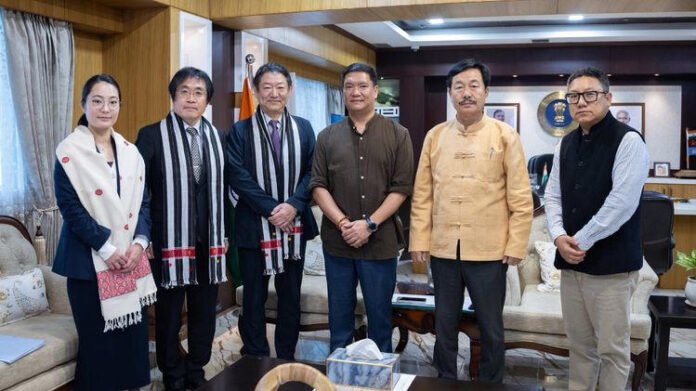A high-level Japanese delegation led by Hiroshi Yoshida, Chairman of the Japan-based Peace and Prosperity Foundation, visited Itanagar, the capital of Arunachal Pradesh, this week. The visit marks a significant step towards closer economic, cultural, and strategic collaboration between Tokyo and New Delhi, particularly in the sensitive and strategically important northeastern state.
Yoshida’s visit, which included meetings with Arunachal Pradesh Chief Minister Pema Khandu, senior state officials, and local business leaders, is seen as a continuation of Japan’s growing engagement with India’s northeastern region. Discussions focused on enhancing infrastructure development, educational exchanges, tourism promotion, and the preservation of indigenous cultures, areas in which Japan has expressed sustained interest.
Chief Minister Khandu welcomed the delegation warmly and highlighted Arunachal’s potential as a bridge between India and Southeast Asia. “Our state is not just a frontier; it is the gateway to the Act East Policy. We are delighted to host our Japanese friends and look forward to building lasting partnerships that will benefit our people,” he said.
The visit comes at a crucial time when geopolitical shifts in the Indo-Pacific region have led to renewed efforts by democratic countries to strengthen alliances and partnerships. Japan has been a consistent supporter of infrastructure development in India’s northeast, funding projects through the Japan International Cooperation Agency (JICA), including roads, bridges, and disaster management infrastructure.
While the Peace and Prosperity Foundation is a non-governmental organization, its leadership’s close ties with Japanese political and business circles make the visit particularly significant. Yoshida, known for his advocacy of democratic values and sustainable development, stressed the importance of people-to-people connections and cultural diplomacy during his interactions in Itanagar.
“We believe in building peace through prosperity, and prosperity through cooperation,” Yoshida said in a public address. “Arunachal Pradesh, with its unique heritage and strategic location, holds immense potential for collaboration in fields ranging from education and healthcare to tourism and technology.”
Sources suggest that Japan may explore new avenues for investment in Arunachal Pradesh, especially in sectors such as eco-tourism, agriculture, and clean energy. Talks are also reportedly underway to establish a student exchange program between Arunachal-based institutions and Japanese universities, aimed at fostering cross-cultural understanding and skill development.
However, the visit has also drawn attention across the border in China, which continues to claim Arunachal Pradesh as part of its territory, referring to it as “South Tibet.” Beijing has previously objected to foreign dignitaries and diplomats visiting the state. Nonetheless, India has consistently reiterated that Arunachal Pradesh is an integral part of the country, and such international engagements are a sovereign matter.
Japan’s increasing presence in the region is in line with its broader Indo-Pacific strategy, which seeks to ensure a free, open, and rules-based order. Analysts believe Tokyo’s interest in Arunachal Pradesh serves both strategic and developmental objectives, as it aligns with shared concerns about China’s assertiveness in the region.
India and Japan, both members of the Quad alliance along with the US and Australia, have stepped up defense, economic, and technological cooperation in recent years. The strengthening of bilateral ties at the regional level, such as in Arunachal Pradesh, adds another layer to this robust partnership.
As the visit concluded, the Peace and Prosperity Foundation announced plans to establish a “Friendship Centre” in Itanagar that would host cultural programs, language training, and policy dialogues. The move is being viewed as a symbolic yet concrete step towards cementing people-level bonds.
In the backdrop of global power shifts, such grassroots diplomacy could play a vital role in fostering mutual respect and understanding. With Arunachal Pradesh opening its arms to the world, and Japan responding with enthusiasm and investment, the region stands on the cusp of a new chapter—one defined by cooperation, connectivity, and cultural exchange.

